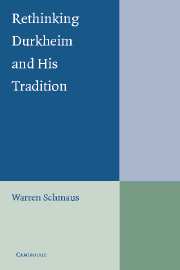Book contents
- Frontmatter
- Contents
- Preface and Acknowledgments
- 1 Durkheim and the Social Character of the Categories
- 2 Historical Background: Aristotle and Kant
- 3 The Categories in Early-Nineteenth-Century French Philosophy
- 4 The Later Eclectic Spiritualism of Paul Janet
- 5 The Early Development of Durkheim's Thought
- 6 Durkheim's Sociological Theory of the Categories
- 7 Prospects for the Sociological Theory of the Categories
- Notes
- Bibliography
- Index
3 - The Categories in Early-Nineteenth-Century French Philosophy
Published online by Cambridge University Press: 16 July 2009
- Frontmatter
- Contents
- Preface and Acknowledgments
- 1 Durkheim and the Social Character of the Categories
- 2 Historical Background: Aristotle and Kant
- 3 The Categories in Early-Nineteenth-Century French Philosophy
- 4 The Later Eclectic Spiritualism of Paul Janet
- 5 The Early Development of Durkheim's Thought
- 6 Durkheim's Sociological Theory of the Categories
- 7 Prospects for the Sociological Theory of the Categories
- Notes
- Bibliography
- Index
Summary
The Introduction of Kantian Philosophy into France
Kant first came to the attention of the French as a moral philosopher during their Revolution. Many regarded him as a supporter of Republican ideals and a proponent of skepticism and atheism (Boas 1925: 165ff.; Vallois 1924: 34). The critical philosophy was only slowly introduced into France due to the difficulty of Kant's work and the fact that few French philosophers read German. Imbued with the French spirit of clarity and precision, many were simply discouraged by the obscurity of Kantian terminology from even trying to read Kant's works. The first French translation of the Critique of Pure Reason, by C.-J. Tissot, did not appear until 1835. F. G. Born's Latin translation of this work was published in 1796 and was quickly followed by his translations of the Critique of Practical Reason, the Critique of Judgment, the Prolegomena, and other important books, constituting a four-volume Latin edition of Kant's works. However, this Latin edition was not widely cited by French philosophers at the time (Vallois 1924: 42–8).
For their knowledge of Kant's philosophy, the French at first relied on essays published in French by the Berlin Academy in the late eighteenth and early nineteenth centuries, written by Christian Gottlieb Selle (1748–1800), Johann Jakob Engel (1741–1802), Louis-Frédéric Ancillon (1744–1814), and his son Jean-Pierre-Frédéric Ancillon (1767–1837).
- Type
- Chapter
- Information
- Rethinking Durkheim and his Tradition , pp. 57 - 75Publisher: Cambridge University PressPrint publication year: 2004

